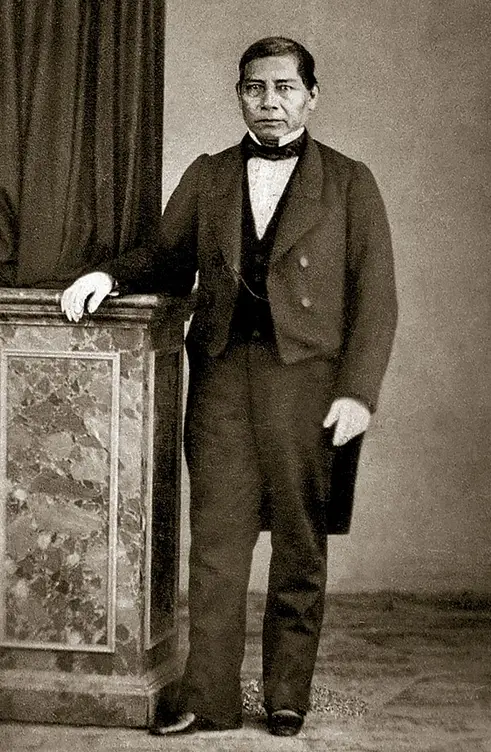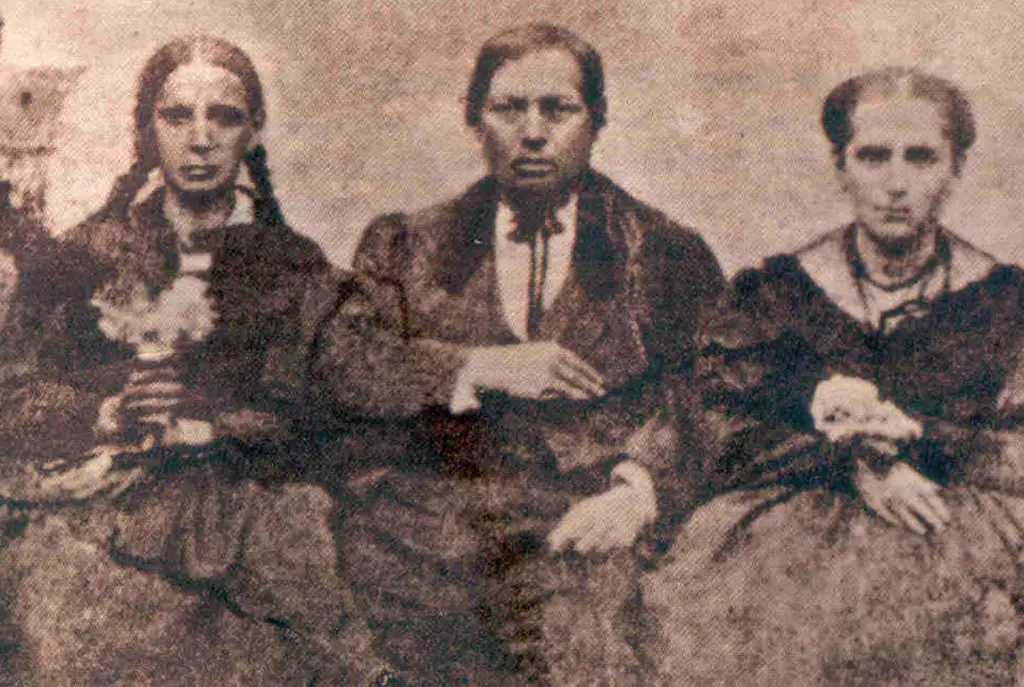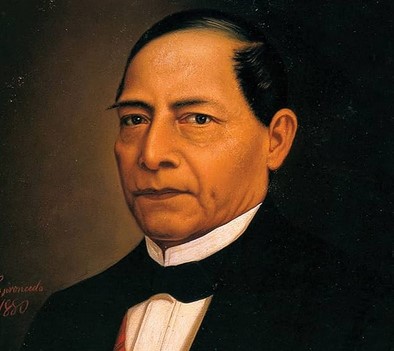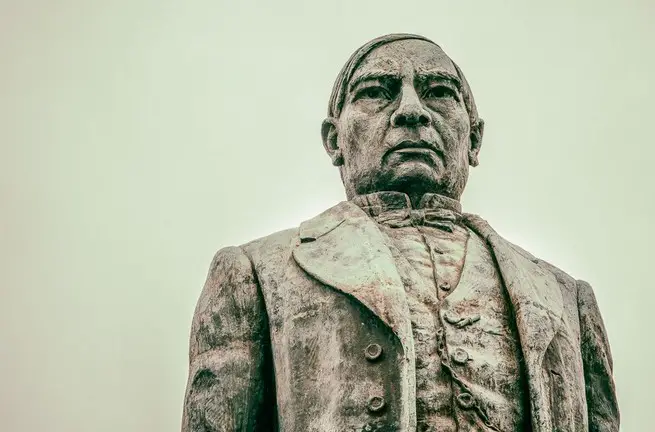Podcast: Play in new window | Download
Subscribe: Apple Podcasts | RSS
 In the tapestry of Mexican history, few figures are as revered and celebrated as Benito Juárez. A man born into poverty and of indigenous Zapotec heritage, Juárez’s remarkable journey from humble beginnings to the highest office in the land is a testament to his indomitable spirit and unwavering commitment to justice and reform. Over the course of his life, Benito Juárez would play a pivotal role in shaping the destiny of Mexico, transforming the nation and leaving behind a legacy that continues to resonate to this day. In this episode, we delve into the life, achievements, and enduring impact of Mexico’s great statesman, Benito Juárez.
In the tapestry of Mexican history, few figures are as revered and celebrated as Benito Juárez. A man born into poverty and of indigenous Zapotec heritage, Juárez’s remarkable journey from humble beginnings to the highest office in the land is a testament to his indomitable spirit and unwavering commitment to justice and reform. Over the course of his life, Benito Juárez would play a pivotal role in shaping the destiny of Mexico, transforming the nation and leaving behind a legacy that continues to resonate to this day. In this episode, we delve into the life, achievements, and enduring impact of Mexico’s great statesman, Benito Juárez.
The future 26th president of Mexico was born Benito Pablo Juárez García on March 21, 1806, in the small village of San Pablo Guelatao, Oaxaca, in what was then the Viceroyalty of New Spain. The mountain village of about 200 people living in straw huts overlooked a beautiful blue lake called La Laguna Encantada. Born to Zapotec parents, young Benito experienced a childhood marked by the hardships of rural poverty. Tragedy struck when he lost his parents at a very young age, leaving him an orphan. Despite these formidable challenges, Juárez displayed an early aptitude for learning and a fierce determination to overcome adversity.
A turning point in young Juárez’s life came when, at age 12, he moved to the city of Oaxaca, to work as a servant in the household of the Meza family where an older sister was employed as a cook. After establishing himself in the city, he left the Mezas and then got a job helping Don Antonio Salanueva, a bookbinder. It was under Salanueva’s employ where Juárez’s innate intelligence and determination began to shine. His employer recognized his potential and helped him to learn Spanish, a language he did not speak upon his arrival in Oaxaca. This transformational experience laid the foundation for his educational journey, which would ultimately lead to a distinguished legal and political career.
 Juárez’s thirst for knowledge and his aptitude for learning were soon evident to those around him. With Salanueva’s support, he embarked on his formal education at the Institute of Sciences and Arts, where he studied law. His time at the institute was instrumental in shaping his thinking and reinforcing his commitment to justice and reform. Upon completing his studies, Benito Juárez embarked on a career in law and quickly distinguished himself in the field. His legal acumen, coupled with his dedication to indigenous rights and social justice, earned him the respect and admiration of many in Oaxaca. He began to take an active interest in local politics, using his legal expertise to advocate for the rights of indigenous peoples and promote social and political reform.
Juárez’s thirst for knowledge and his aptitude for learning were soon evident to those around him. With Salanueva’s support, he embarked on his formal education at the Institute of Sciences and Arts, where he studied law. His time at the institute was instrumental in shaping his thinking and reinforcing his commitment to justice and reform. Upon completing his studies, Benito Juárez embarked on a career in law and quickly distinguished himself in the field. His legal acumen, coupled with his dedication to indigenous rights and social justice, earned him the respect and admiration of many in Oaxaca. He began to take an active interest in local politics, using his legal expertise to advocate for the rights of indigenous peoples and promote social and political reform.
Juárez’s early political activism was closely aligned with the liberal movement in Mexico, which sought to challenge the conservative status quo that was deeply entrenched in Mexican society and politics, a holdover from the Spanish colonial days. His passion for reform, commitment to secularism, and the separation of church and state became defining features of his political ideology. As his reputation grew, Juárez took on various roles in the state government, serving as a judge, a city council member, and later, as a state deputy in the Oaxaca state legislature. His dedication to reform and justice continued to gain prominence, and by 1847, Benito Juárez had ascended to the position of the governor of Oaxaca.
The 1850s marked a critical period in Mexican history known as ‘La Reforma.’ During this time, Mexico was undergoing significant political and social changes, as liberals and conservatives grappled for control and influence over the country. Juárez found himself at the forefront of these tumultuous events, fighting for liberal principles against the deeply entrenched conservative forces. During the last dictatorship of Santa Ana in 1852, Juárez was sent to an island prison off the coast of Veracruz and then was exiled to Havana, Cuba. From Cuba he made it to New Orleans where he survived working in a cigar factory. During this time his wife – who was still in Mexico – sent him money to augment his cigar-making income. While in New Orleans, Juárez met other Mexican exiles and planned his return.
 One of the pivotal moments in this struggle was the drafting of the ‘Plan of Ayutla’ in 1854 by Mexican liberals. This document sought to overthrow the dictatorship of Antonio López de Santa Anna, who had dominated Mexican politics for much of the mid-19th century. The plan’s success led to the ousting of Santa Anna and the ushering in of a period of liberal reforms. With Santa Ana gone, Juárez returned to Mexico and advocated for a more liberal, democratic, and secular Mexican government.
One of the pivotal moments in this struggle was the drafting of the ‘Plan of Ayutla’ in 1854 by Mexican liberals. This document sought to overthrow the dictatorship of Antonio López de Santa Anna, who had dominated Mexican politics for much of the mid-19th century. The plan’s success led to the ousting of Santa Anna and the ushering in of a period of liberal reforms. With Santa Ana gone, Juárez returned to Mexico and advocated for a more liberal, democratic, and secular Mexican government.
In 1857, the Mexican Constitution of 1857 was adopted, which enshrined several liberal principles, including the separation of church and state, protection of individual rights, and freedom of speech. Much land was stripped away from the Catholic Church and sold off or given away in an attempt to lessen the overwhelming influence of the church on Mexican society and to stimulate economic development. Benito Juárez played an influential role in the formation and implementation of these significant reforms.
One of the most notable reforms introduced during this period was the ‘Ley Juárez’, or in English, the Law of Juárez, of 1859. This law aimed to break the power of the Catholic Church and the military, both of which had been historically powerful in Mexican society and politics. The Law of Juárez abolished special courts for the clergy and the military, marking a significant step towards a more secular, democratic, and equitable Mexican state. These reforms, however, were not without their opponents. The conservatives, who viewed the liberal reforms as a direct threat to their interests, responded with force. The ensuing conflict, lasting from 1858 to 1861, was known as the War of Reform. It was a brutal and protracted civil war that would test Juárez’s resilience and the commitment of his fellow liberals to their cause.
The turbulent period of Mexican history that followed would test Benito Juárez’s leadership and resilience like never before. In 1862, the French, led by Napoleon III, invaded Mexico with the goal of establishing a French-backed empire in the Americas. The French intervention in Mexico was a direct challenge to the sovereignty and independence of the Mexican nation. Juárez, unwavering in his commitment to defending Mexican sovereignty, faced the invading French forces with courage and determination. The French, with the support of elite conservative Mexican allies, installed an Austrian Habsburg prince, later known as Maximilian the First, as the emperor of Mexico. However, Benito Juárez refused to recognize this foreign-imposed monarchy and took up the mantle of leadership in exile, operating along the U.S.-Mexico border. Juárez’s forces temporarily stopped at a place called El Paso del Norte which now proudly bears the statesman’s name and is known today as Ciudad Juárez. The next five years saw fierce resistance from the Mexican liberals, led by Juárez. With support from the United States under the guise of the Monroe Doctrine, and after several pivotal battles, Juárez’s forces gradually regained control of Mexican territory. One of these battles was the Battle of Puebla on May 5, 1862, commemorated today as the Cinco de Mayo holiday.
 In 1867, Maximilian’s rule began to unravel. With increasing pressure from both the Mexican liberals and the withdrawal of French troops due to external conflicts, Maximilian was captured. Benito Juárez, having successfully defended Mexican sovereignty and upheld the ideals of La Reforma, returned to Mexico City in triumph. Following his return to Mexico City, Juárez was re-elected as president in 1867, and again in 1871. His later years in office were marked by a focus on modernizing Mexico. Juárez initiated a range of reforms and policies aimed at spurring economic growth, infrastructure development, and improving the quality of life of all Mexican citizens. Paramount among Juárez’s initiatives involved the improving of education in Mexico. He believed that access to education was vital for the progress and development of the nation. During his time in office, he worked to expand educational opportunities, especially for marginalized and indigenous populations. Another notable aspect of Juárez’s presidency was his focus on infrastructure development. Roads, railways, and telegraph lines were constructed or expanded to connect different parts of the country. This not only facilitated economic growth but also helped in the consolidation of the Mexican state.
In 1867, Maximilian’s rule began to unravel. With increasing pressure from both the Mexican liberals and the withdrawal of French troops due to external conflicts, Maximilian was captured. Benito Juárez, having successfully defended Mexican sovereignty and upheld the ideals of La Reforma, returned to Mexico City in triumph. Following his return to Mexico City, Juárez was re-elected as president in 1867, and again in 1871. His later years in office were marked by a focus on modernizing Mexico. Juárez initiated a range of reforms and policies aimed at spurring economic growth, infrastructure development, and improving the quality of life of all Mexican citizens. Paramount among Juárez’s initiatives involved the improving of education in Mexico. He believed that access to education was vital for the progress and development of the nation. During his time in office, he worked to expand educational opportunities, especially for marginalized and indigenous populations. Another notable aspect of Juárez’s presidency was his focus on infrastructure development. Roads, railways, and telegraph lines were constructed or expanded to connect different parts of the country. This not only facilitated economic growth but also helped in the consolidation of the Mexican state.
While Juárez’s leadership during the French intervention and his early years as president are celebrated for their resilience and commitment to Mexican sovereignty, his later years in office were not without controversy. Some of his policies and actions were criticized as authoritarian, leading to opposition and dissent. Despite these challenges, Juárez remained dedicated to the principles of La Reforma and his vision for a modern, democratic, and equitable Mexico.
Tragically, Benito Juárez’s life was cut short. He passed away on July 18, 1872, at the age of 66. His death marked the end of an era, but the beginning of a legacy that would continue to shape Mexico’s identity and political landscape.
 The legacy of Benito Juárez is enduring and multifaceted. His steadfast commitment to the principles of La Reforma, his resilience in the face of foreign invasion, and his dedication to justice, sovereignty, and social reform continue to inspire generations of Mexicans. His famous quote, “Among individuals, as among nations, respect for the rights of others is peace,” reflects his unwavering commitment to justice and peace.
The legacy of Benito Juárez is enduring and multifaceted. His steadfast commitment to the principles of La Reforma, his resilience in the face of foreign invasion, and his dedication to justice, sovereignty, and social reform continue to inspire generations of Mexicans. His famous quote, “Among individuals, as among nations, respect for the rights of others is peace,” reflects his unwavering commitment to justice and peace.
Today, Juárez is celebrated as a national hero in Mexico. His birthday, March 21, is observed as ‘Benito Juárez Day,’ a national public holiday. His influence can be seen in Mexican political thought and his life story serves as a symbol of the power of unwavering vision and steadfast principles in the face of adversity.
Benito Juárez stands as a beacon of hope and an embodiment of the Mexican spirit: passionate, resilient, and ever-aspiring to a brighter future. His life, marked by a remarkable journey from orphaned child to a leader who defended Mexican sovereignty and promoted progressive reforms, continues to inspire and shape the nation’s identity. Benito Juárez’s legacy is a testament to the potential within every individual to overcome adversity and effect profound change.
REFERENCES
Baines, Rae. Benito Juarez, Hero of Modern Mexico. Mahwah, NJ: Troll Communications, 1997. We are Amazon affiliates. Buy the book on Amazon here: https://amzn.to/3Sl8nbc
Burke, Ulick Ralph. A Life of Benito Juarez. New York: Legere Street Press, 2022. We are Amazon affiliates. Buy the book on Amazon here: https://amzn.to/40gsmd9
